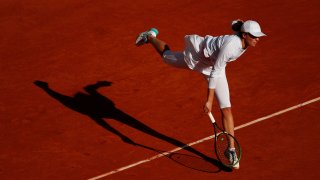
Minutes after suddenly becoming a Grand Slam champion at age 19, while ranked just 54th, Iga Swiatek held a microphone during the French Open trophy presentation and was hesitant for pretty much the only time over the past two weeks.
“First of all, I'm not very good at speeches,” Swiatek began, haltingly, “so, sorry, because I won my last tournament like two years ago, and I really don't know who to thank.”
When she's got a racket in her hand, it's a whole different story. With the poise of a veteran and the shots of a champion, Swiatek wrapped up a dominating run at Roland Garros, grabbing the last six games to beat Sofia Kenin 6-4, 6-1 in Saturday's final.
“Two years ago, I won a junior Grand Slam, and right now I’m here. It feels like such a short time,” Swiatek said, her voice cracking. “I’m just overwhelmed.”
Swiatek is the first Polish tennis player to win a major singles trophy and said, “I know it’s pretty crazy back home” — where one newspaper's front page was splashed with the headline “Poland Garros” ahead of the final.
When she smacked one last heavy-topspin forehand winner to claim her first tour-level title of any sort, Swiatek placed her right hand over her mouth and crouched, shaking her head.
Hard to believe? Maybe. This was, after all, only her seventh major tournament; she'd never been past the fourth round.
U.S. & World
Stories that affect your life across the U.S. and around the world.
“It’s, like, a life-changing experience,” Swiatek said. “Yeah, I just feel like I kind of made history."
The way she played these two weeks — with those great groundstrokes, the occasional drop shot, terrific returning and impressive court coverage — made this outcome less of a surprise.
Kenin said Swiatek's “spinny forehand up the line" bounces high enough to make things difficult for opponents.
Swiatek lost 28 games across seven matches and is the first woman to triumph in Paris without ceding a set since Justine Henin in 2007. She's the first teen to win the women's title there since Iva Majoli in 1997.
“She’s, like, really hot right now,” said Kenin, who was hampered by an injury to her upper left leg, an issue that first cropped up during a practice session last weekend.
Swiatek beat both 2018 champion Simona Halep and 2019 runner-up Marketa Vondrousova 6-1, 6-2.
So it made sense that Swiatek would handle the fourth-seeded Kenin, even if the 21-year-old from Florida won the Australian Open in February and entered Saturday 16-1 in Grand Slam play this year.
She had yet to face the composed Swiatek, who only recently completed her high school studies and listens to “Welcome to the Jungle” by Guns N' Roses through her black headphones before walking on court.
Swiatek travels with a sports psychologist and meditates during changeovers, breathing slowly with her eyes closed.
That helped her deal with the stage and the stakes.
“Everybody is stressed when they’re playing Grand Slam finals. I just knew that Sofia may also be stressed, that she’s not a machine. I was aware that we can both, like, struggle, and we’re probably not going to play our best tennis, because it’s hard with so much pressure,” Swiatek said. "But I just did everything I’ve done in the previous rounds. I focused on technique and tactics. I tried to get rid of expectations, you know — just play one ball after another."
This weekend is the culmination of an unusual two weeks, to say the least. The tournament was postponed form May-June to September-October because of the coronavirus pandemic; the recently rising number of COVID-19 cases in France led the government to limit the number of spectators allowed on the grounds to 1,000 each day.
Some top women, including 2019 major champions Ash Barty, Naomi Osaka and Bianca Andreescu, didn’t enter the event at all; 23-time Slam winner Serena Williams withdrew before the second round with an injury.
The temperature was in the mid-50s (low teens Celsius), with a slight breeze, and the hundreds of fans scattered in Court Philippe Chatrier were mostly subdued — other than a group shouting Swiatek’s first name, stretching it out to sound like “Eeeeeeeeeee-gah.”
She took 12 of the first 15 points, thanks to four winners and zero unforced errors.
“I guess it was nerves or something,” said Kenin, who occasionally dropped or kicked her red-white-and-blue racket. “But I found my groove.”
Soon enough, it was 3-all.
But Swiatek is nothing if not resilient. She served for the set at 5-3, and got broken, but responded right away by stealing yet another one of Kenin's service games.
Same thing happened to begin the second set: Kenin broke for a 1-0 edge, and Swiatek broke right back.
At the changeover at 2-1, Kenin left the court for a medical timeout, then returned with her left thigh wrapped. While Kenin was gone, Swiatek stayed warm by pulling on a white jacket and hitting some serves.
When play resumed, Swiatek needed 12 minutes to close it out, finishing with a 25-10 edge in winners.
All that remained was to hear the Polish anthem — never before played after a major singles final — and kiss her shiny trophy.
After addressing the crowd for a bit, Swiatek asked, “Should I say something else?”
The emcee responded that she could if she wanted.
“I have no idea,” Swiatek said. “Sorry.”
Better practice up, Iga. The tennis world expects to see you at more such ceremonies in the future.



